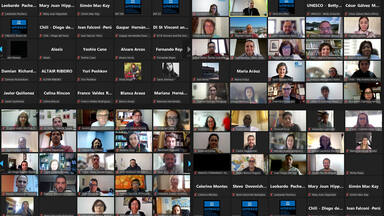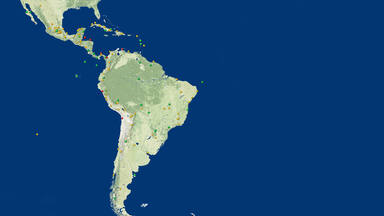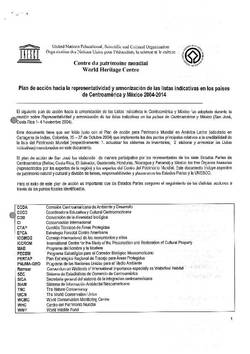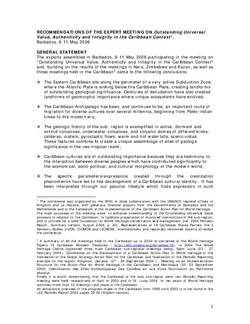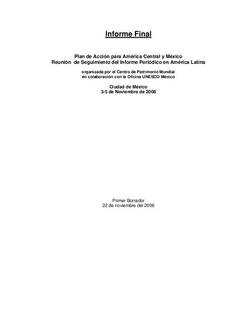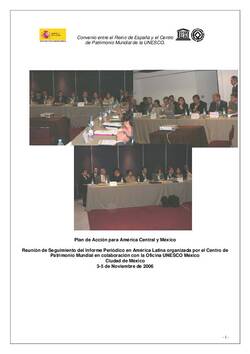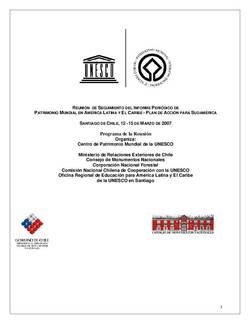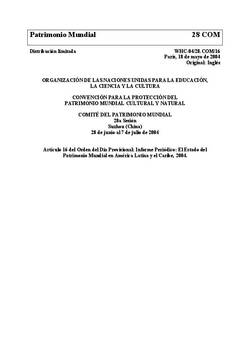El Comité expresó su deseo de examinar los Informes Periódicos de los Estados Parte región por región. El Comité del Patrimonio Mundial examinó el Informe sobre el estado del Patrimonio Mundial en América Latina y el Caribe en su 28ª reunión en 2004.
El Centro de Patrimonio Mundial de la UNESCO, a través de su asesor para la región América Latina y el Caribe, radicado en la Oficina de la UNESCO en Montevideo, coordinó el proceso de Informes Periódicos, proporcionando asistencia a los Estados Parte y asegurando la preparación del Informe de Síntesis Regional.
El plan de trabajo para el Informe Periódico aprobado por el Comité de Patrimonio Mundial fue organizado en las tres subregiones: América del Sur, El Caribe y América Central/México.
1. Documentación básica sobre el primer ciclo del proceso de Informes Periódicos2. Información importante sobre el plan de trabajo 2000-2004 disponible en el Centro del Patrimonio Mundial de la UNESCO.
Estrategia Regional y Plan de Trabajo (2000-2004)
Enfoque
El Informe Periódico de la región de América Latina y el Caribe se examinó en la 28ª Sesión del Comité del Patrimonio Mundial en el año 2004.
Con el fin de garantizar un verdadero proceso participativo a nivel regional, el Informe Periódico fue coordinado por el asesor en materia de Patrimonio Mundial en América Latina y el Caribe, radicado en la oficina de la UNESCO de Montevideo, en estrecha colaboración con el Centro del Patrimonio Mundial y los Órganos Consultivos.
Para iniciar el proceso de Informes Periódicos a nivel regional, el personal del Centro del Patrimonio Mundial asistió a la reunión de los Delegados Permanentes de América Latina y el Caribe en junio de 2000 para discutir sobre el enfoque que debe ser adoptado en cuanto al establecimiento de un plan de trabajo para el Informe Periódico en la Región.
Plan de trabajo
El plan de trabajo aprobado por el Comité del Patrimonio Mundial en su Reunión de diciembre de 2000 es el siguiente:
Fase 1: Preparación del ejercicio del Informe Periódico (2000– 2001)
El Centro del Patrimonio Mundial preparó documentos sobre el grado de implementación de la Convención del Patrimonio Mundial para cada una de las tres subregiones mencionadas anteriormente así como la creación de una base de datos con la información relevante sobre el historial de inscripción y el análisis del estado de conservación de los bienes del Patrimonio Mundial.
El centro configuró un sistema de gestión de información a través de internet para ofrecer información de referencia a los Estados Parte en la aplicación de la Convención en la región, a los sitios del Patrimonio Mundial y a la presentación de informes por anticipado, así como facilitar la comunicación entre las tres subregiones. La información de referencia también estaría disponible en ejemplar papel y/o CD-ROM.
Los Estados Parte y los Órganos Consultivos solicitaron la identificación de puntos focales para las actividades de los Informes Periódicos en el ámbito del patrimonio natural y cultural.
Los cuestionarios desarrollados por el Centro del Patrimonio Mundial para asistir a los Estados Parte en la preparación de los informes periódicos serán traducidos al español.
Fase 2: Reuniones subregionales informativas (primera mitad de 2002)
Se celebraron dos reuniones subregionales (América del Sur, Montevideo, Uruguay, marzo de 2002, y América Central/México, México, mayo de 2002) en las que participaron los puntos focales de los Estados Parte, los Órganos Consultivos y expertos de la región.
Se informó a los Estados Parte del Caribe sobre el Informe Periódico a través del Curso Regional de Formación sobre la aplicación de la Convención del Patrimonio Mundial (septiembre-octubre de 2001). Considerando el número reducido de bienes del Patrimonio Mundial en esta área, con excepción de Cuba, se hizo hincapié en las disposiciones generales de la Convención y su capacidad de proteger y gestionar los sitios del patrimonio cultural y natural (Sección I de los Informes Periódicos). Para ello, se emprendió un análisis del marco jurídico e institucional. Más información y asesoramiento fueron suministrados por escrito y a través de misiones en la Fase 3.
Fase 3: Elaboración de los informes nacionales (segunda mitad de 2002 – primer trimestre de 2003)
Tras las reuniones informativas subregionales, los Estados Parte prepararon sus informes nacionales. Se esperaba que los puntos focales de los Estados Parte monitorearan el proceso y mantuvieran contacto con la UNESCO en el progreso y la necesidad de consejo y asistencia. Se proporcionó asistencia con petición previa de los Estados Parte interesados.
Fase 4: Reunión subregional de evaluación (segunda mitad de 2003)
Se celebraron tres reuniones subregionales en la segunda mitad de 2003 con el fin de revisar los informes nacionales de la subregión y extraer las conclusiones preliminares y recomendaciones para contribuir a la evaluación de la reunión regional.
Fase 5: Reunión regional de evaluación y preparación del informe a nivel regional sobre el estado del Patrimonio Mundial (finales de 2003)
Se celebró una reunión de evaluación a nivel regional en la que se formularon las conclusiones que fueron presentadas posteriormente al Comité del Patrimonio Mundial en su reunión de junio de 2004.
Decisions / Resolutions (8)
The World Heritage Committee,
1. Having examined Document WHC-12/36.COM/10B,
2. Recalling Decisions 30 COM 11A.1, 30 COM 11A.2, 31 COM 11A.1, 31 COM 11A.2, 32 COM 11D, 34 COM 10B.3 and 35 COM 10C.2 adopted at its 30th (Vilnius, 2006), 31st (Christchurch, 2007), 32nd (Quebec City, 2008), 34th (Brasilia, 2010) and 35th (UNESCO, 2011) sessions, respectively,
3. Takes note of the follow-up activities to the first cycle of the Periodic Reporting exercise in the region of Europe and North America and the activities in preparation of the launching of its second cycle;
4. Thanks the Maltese authorities for having hosted the preparatory meeting for Mediterranean Europe in Valetta from 21 to 24 September 2011 and the Icelandic authorities for having hosted the preparatory meeting for Nordic, Baltic and Western Europe in Reykjavik from 18 to 21 October 2011;
5. Also thanks the Nordic World Heritage Foundation for its collaboration in the preparation of the second cycle of the Periodic Reporting exercise, including preparation of meetings as well as relevant tools;
6. Expresses its sincere appreciation to the German authorities for having proposed to host a meeting for Nordic, Baltic, Western and Mediterranean Europe in Berlin from 19 to 20 September 2012, the Georgian authorities for having proposed to host a meeting for Central, Eastern and South-Eastern Europe in autumn 2012, the Italian authorities for having proposed to host a meeting for Mediterranean Europe in Florence in September 2013 and the authorities of Luxembourg for having proposed to host a meeting for Nordic, Baltic and Western Europe in 2013/2014;
7. Welcomes the initiative of the World Heritage Centre and ICCROM to address the priority needs in training and capacity-building for the preservation of World Heritage properties in Central, Eastern and South-Eastern Europe, by an integrated and targeted strategy in the context of the Second Cycle of Periodic Reporting;
8. Commends the States Parties which have submitted draft retrospective Statements of Outstanding Universal Value before the official launching of the Periodic Reporting exercise as requested in Decision 35 COM 10C.2 and urges the States Parties to submit the pending retrospective Statements of Outstanding Universal Value as soon as possible;
9. Reiterates its gratitude to the States Parties of Andorra, Monaco, Portugal and the Netherlands who have made financial contributions to the implementation of the second cycle of the Periodic Reporting exercise in Europe and North America, acknowledges with thanks the pledge by the Flemish Government to financially support the exercise and encourages further support and collaboration for the future;
10. Also takes note of the Road Map developed at the Reykjavik meeting in 2011 and requests the States Parties to make an effort towards a coordinated approach for its implementation;
11. Decides to launch the second cycle of the Periodic Reporting in the Europe and North America region and also reiterates that it will take place on a two-year basis (North America, Western, Nordic and Baltic Europe sub-regions, for the first year, and Mediterranean, Central, Eastern and South-Eastern Europe, for the second year) provided that a report on the Periodic Reporting exercise for North America will be presented at the 38th session of the World Heritage Committee in 2014, and an overall report on the Periodic Reporting exercise for Europe will be presented at the 39th session of the World Heritage Committee in 2015;
12. Also welcomes the creation of the web platform for the follow-up and implementation of the Periodic Reporting exercise and also encourages the States Parties, the World Heritage Centre, the Advisory Bodies and other concerned partners to explore all the opportunities that this tool can provide for the joint implementation of the exercise;
13. Also requests the World Heritage Centre to report back to the World Heritage Committee on progress achieved in the Periodic Reporting exercise at its 37th session in 2013.
Read more about the decisionThe World Heritage Committee,
1. Having examined Document WHC-11/35.COM/10B,
2. Recalling decisions 28 COM 16, 7 EXT.COM 5E, 29 COM 5, 30 COM 11E, 32 COM 11D and 34 COM 10B.2 adopted respectively at its 28th session (Suzhou, 2004), 7th extraordinary session (UNESCO, 2004), 29th session (Durban, 2005), 30th session (Vilnius 2006), 32nd session (Quebec City, 2008) and 34th session (Brasilia, 2010),
3. Takes note of the progress achieved in the follow-up to the first cycle of Periodic Reporting in the Latin America and Caribbean region, as well as the results of activities in preparation for the launching of its second cycle, and in particular of the sub-regional workshops organized in Zacatecas (Mexico), Rio de Janeiro (Brazil), and Bridgetown (Barbados);
4. Welcomes the financial collaboration for the Periodic Reporting exercise offered by the Spanish Funds-in-Trust for World Heritage, Category 2 centres and States Parties and encourages them to continue to provide assistance for the implementation of the process;
5. Commends the States Parties of the Region for their achievements in the submission of the draft retrospective Statements of Outstanding Universal Value before the official launching of the Periodic Reporting exercise as requested in Decision 31 COM 11D.1;
6. Decides to launch the second cycle of the Periodic Reporting in the Latin American and Caribbean region and requests the States Parties to actively participate in this process;
7. Welcomes the creation of the web platform for the follow-up and implementation of the Periodic Reporting exercise and encourages the World Heritage Centre, States Parties, Category 2 centres, Advisory Bodies and other concerned partners to explore all the opportunities that this tool can provide for communication and coordination;
8. Also requests States Parties of the Latin American and Caribbean region and the Advisory Bodies to complete the review process for the retrospective Statements of Outstanding Universal Value for examination by the World Heritage Committee at its 36th session in 2012;
9. Notes with satisfaction the results already achieved and also requests the World Heritage Centre and the Advisory Bodies to continue providing assistance to the States Parties in the Latin American and Caribbean region in the framework of the second cycle of the Periodic Reporting;
10. Further requests the World Heritage Centre to keep it informed of progress achieved in the Periodic Reporting exercise at its 36th session in 2012.
Read more about the decisionThe World Heritage Committee,
1. Having examined Document WHC-10/34.COM/10C,
2. Recalling Decisions 31 COM 11D.1, 32 COM 11E, and 33 COM 11B, adopted respectively at its 31st session (Christchurch, 2007), 32nd session (Quebec City, 2008), and 33rd session (Seville, 2009),
3. Takes note of the progress achieved in the follow up to the first cycle of Periodic Reporting, as well as the results of activities in preparation for the launching of its second cycle, and in particular of the sub-regional Workshops organised in Maupiti (French Polynesia, France), Taiyuan (China), and Dehradun (India);
4. Decides to launch a second cycle of Periodic Reporting in Asia and the Pacific region and requests the States Parties of Asia and the Pacific region to actively participate in this process;
5. Also requests States Parties of Asia and the Pacific region to prepare all the missing retrospective Statements of Outstanding Universal Value concerning properties located in their territory and to submit them to the World Heritage Centre before 1 February 2011 for examination by the World Heritage Committee at its 36th session in 2012;
6. Further requests the World Heritage Centre and the Advisory Bodies to provide assistance to the States Parties in Asia and the Pacific region in the preparation of Periodic Reporting;
7. Requests furthermore the World Heritage Centre to keep it informed of progress achieved in the Periodic Reporting exercise at its 35th session in 2011.
Read more about the decisionThe World Heritage Committee,
1. Having examined Document WHC-10/34.COM/10B,
2. Recalling Decisions 28 COM 16 adopted at its 28th session (Suzhou, 2004), 7 EXT.COM 5E adopted at its 7th extraordinary session (UNESCO, 2004), 29 COM 5 adopted at its 29th session (Durban, 2005) and 32 COM 11D adopted at its 32nd session (Quebec City, 2008),
3. Takes note of the information provided on the progress made in the implementation of the Decisions for the follow-up to the Periodic Reporting in Latin America and the Caribbean and the preparation for the second cycle of the Periodic Report exercise;
4. Acknowledges the financial and technical collaboration provided by the Spanish Funds-in-Trust (SFIT) for the follow-up of the Periodic Reporting exercise, and encourages the SFIT to continue its efforts towards the World Heritage conservation;
5. Welcomes the financial collaboration for the Periodic Reporting exercise, offered by UNESCO Field Offices and Category 2 Centres, and also encourages them to continue providing assistance for the implementation of the process;
6. Thanks the States Parties hosting the meetings for their commitment in the preservation of World Heritage and the implementation of the World Heritage Convention;
7. Calls upon the States Parties, the World Heritage Centre and all the other stakeholders involved in the protection and conservation of natural and cultural heritage of the region, to ensure the necessary financial and human resources to implement the Second Cycle of the Periodic Reporting exercise;
8. Requests the States Parties, to submit the required retrospective Statements of Outstanding Universal Value to the World Heritage Centre by 31 July 2010, in order to guarantee the appropriate implementation of the Second Cycle of the Periodic Reporting exercise as requested by Decision 31 COM 11D.1;
9. Also requests the States Parties, in coordination with the World Heritage Centre and the Advisory Bodies, to submit the Action Plan 2011 -2013 and to prepare a progress report on the implementation of the Second Cycle Latin America and the Caribbean Periodic Reporting for examination by the World Heritage Committee at its 35th session in 2011.
Read more about the decisionThe World Heritage Committee,
1. Having examined Document WHC-08/32.COM/11D,
2. Recalling Decisions 28 COM 16 adopted at its 28th session (Suzhou, 2004), 7 EXT.COM 5E adopted at its 7th extraordinary session (UNESCO, 2004) and 29 COM 5 adopted at its 29th session (Durban, 2005),
3. Takes note of the information provided by the World Heritage Centre on the progress made in the implementation of the above-mentioned Decisions for the follow-up to the Periodic Report in Latin America and the Caribbean;
4. Notes with concern the lack of progress with respect to the SIDS Programme as agreed at the 29th session of the Committee in Durban (2005);
5. Thanks the financial and technical collaboration provided by the Spanish Funds-in-Trust for the follow up of the Periodic Report exercise, and encourages the SFIT to continue its efforts towards the heritage conservation;
6. Requests the World Heritage Centre, in collaboration with the Advisory Bodies, the UNESCO regional offices and the States Parties of the region, to continue implementing the Action Plans concentrating on the priorities identified at the sub-regional workshops of 2006 and 2007, and to submit revised Action Plans covering the period 2011-2016, including a budget estimate, for the consideration of the Committee at its 34th Session in 2010;
7. Invites the Director-General of UNESCO to review operations and staffing in the UNESCO regional offices to ensure that services are provided in a coordinated manner with the World Heritage Centre, to assist the States Parties in Latin America and the Caribbean in the implementation of the World Heritage Convention and the respective Action Plans;
8. Calls upon the States Parties, the World Heritage Centre and all the other stakeholders involved in the protection and conservation of natural and cultural heritage of the region to establish a fund raising strategy to provide the necessary financial and human resources required to implement the World Heritage Action Plans;
9. Also requests the World Heritage Centre to provide a detailed report on the results and follow-up of the SIDS programme for the Committee's consideration at its 33rd session in 2009.
10. Strongly encourages the States Parties, other World Heritage partners and stakeholders in the region to cooperate actively and take the necessary actions to follow up on the implementation of the Action Plans for World Heritage in Latin America and the Caribbean in a concerted and concrete manner;
11. Further requests the World Heritage Centre to report to the Committee at its 34th session in 2010 on the implementation of the Caribbean and Latin American Action Plans.
Read more about the decisionThe World Heritage Committee,
1. Having examined Document WHC-06/30.COM/11E,
2. Recalling Decisions 28 COM 16, 7 EXT.COM 5E and 29 COM 5 adopted at its 28th session (Suzhou, 2004), 7th extraordinary session (UNESCO, 2004) and 29th session (Durban, 2005) respectively,
3. Takes note of the information provided by the World Heritage Centre on the progress made in the implementation of the above-mentioned Decisions for the follow-up to the Periodic Report in Latin America and the Caribbean;
4. Requests the World Heritage Centre, in collaboration with the Advisory Bodies, the UNESCO regional offices and the States Parties of the region, to further develop the Caribbean and the Latin American Action Plans into operational work plans and identify partners for their implementation;
5. Invites the Director-General of UNESCO to review operations and staffing in the UNESCO regional offices to ensure that services are provided in a coordinated manner with the World Heritage Centre to assist the States Parties in Latin America and the Caribbean in the implementation of the World Heritage Convention and the respective Action Plans;
6. Calls upon the States Parties, the World Heritage Centre and all the other stakeholders involved in the protection and conservation of natural and cultural heritage of the region to establish a fund raising strategy to provide the necessary financial and human resources required to implement the World Heritage Action Plans;
7. Strongly encourages the States Parties, other World Heritage partners and stakeholders in the region to cooperate actively and take the necessary actions to follow up on the implementation of the Action Plans for World Heritage in Latin America and the Caribbean in a concerted and concrete manner;
8. Encourages the States Parties of Argentina, Bolivia, Chile, Colombia, Ecuador and Peru to continue working together for the preparation of the trans-national nomination dossiers (Qhapaq Ñan - Main Andean Road) and requests the States Parties to submit a progress report by 1 February 2007 for examination by the Committee at its 31st session in 2007 ;
9. Calls upon the donors to continue supporting the initiative and thanks the World Heritage Centre for technical support;
10. Requests the Director of the World Heritage Centre to report at its 32nd session in 2008 on the implementation of the Caribbean and Latin American Action Plans.
Read more about the decision- Having examined Documents WHC-04/7EXT.COM/5A, WHC-04/7 EXT.COM/5B, WHC-04/7 EXT.COM/5C, WHC-04/7 EXT.COM/5D, and WHC-04/7 EXT.COM/5E,
- Aware of the need to:
- study and reflect on the first cycle of Periodic Reporting;
- develop strategic direction on the forms and the format of the Periodic Reports, training priorities and international cooperation priorities; and
- to streamline the Committee's consideration of matters raised through Periodic Reporting relating to inscribed properties;
- Decides to suspend for one year the commencement of the next cycle of Periodic Reporting.
The World Heritage Committee,
1. Expressing its sincere appreciation to the States Parties of Latin America and the Caribbean, the World Heritage Centre, the Advisory Bodies and the regional experts involved in the periodic reporting exercise for their collaboration in the successful completion of the comprehensive report on “The State of the World Heritage in Latin America and the Caribbean, 2004 Periodic Report”,
2. Takes note of the periodic report and endorses its Strategic Framework for Action contained in it;
3. Also endorses the Caribbean Action Plan for World Heritage 2004-2014 contained in the periodic report, and urges the World Heritage Centre to promote the development of a similar Action Plan for Latin America – in particular, by convening a meeting of representatives of such sub-region not later than December 1st, 2004;
4. Welcomes the particular attention paid to the Caribbean sub-region that in the past has had a limited participation in the activities of the World Heritage Convention and the cultural and natural heritage of which is still underrepresented on the World Heritage List, with recent meetings on periodic reporting in Port-au-Prince (Haiti), harmonization of Tentative Lists in Kingstown (Saint Vincent & the Grenadines) and the preparation of an action plan in favour of World Heritage in Castries (Saint Lucia);
5. Invites the Governments of the Bahamas and Trinidad & Tobago to consider ratification of the World Heritage Convention, so as to achieve full participation of the Caribbean sub-region in World Heritage;
6. Also welcomes the various activities in Latin America during 2002 and 2003, that have a direct impact in the periodic report, including the expert meetings related to the process of preparation of the transborder nomination of “Qhapaq Ñan – Camino Principal Andino”, the regional meeting in Santiago de Querétaro (Mexico), the sub regional workshops in Puerto Iguazú and Córdoba (Argentina) on capacity building for the management of World Heritage properties, and the regional seminar in Córdoba (Argentina) on the application of satellite technologies to World Heritage conservation;
7. Notes that the conclusions of the Querétaro meeting refer to the List of the Americas, and requests the World Heritage Centre to report on such List at its 29th session (2005) – in particular, as regards its relationship with the World Heritage List; Decisions adopted at the 28th session of the World Heritage WHC-04/28 COM/26, p.147 Committee (Suzhou, 2004)
8. Requests the World Heritage Centre to publish, as early as possible, the periodic report in a user-friendly version in English, French and Spanish, for wide distribution in the region among all stakeholders;
9. Requests the World Heritage Centre, in collaboration with the Advisory Bodies and the States Parties of the region, to further develop the Caribbean and the Latin American Action Plans into operational work plans and identify partners for their implementation;
10. Recommends to the Director-General that he reviews operations and staffing in the UNESCO Offices in the region, particularly in the Caribbean sub-region, to ensure that improved services are provided in a coordinated manner with the World Heritage Centre to assist the States Parties in Latin America and the Caribbean in the enhanced implementation of the World Heritage Convention and their respective Action Plans;
11. Strongly encourages the States Parties and all other World Heritage partners and stakeholders in the region to co-operate actively and to take the necessary actions to follow-up in a concerted and concrete manner in the implementation of the Action Plans for World Heritage in the region of Latin America and the Caribbean;
12. Requests the World Heritage Centre to report on the follow-up of the regional periodic report – and, in particular, on the implementation of the Caribbean and Latin American Action Plans – at its 7th extraordinary session (Paris, December 2004).
Read more about the decision